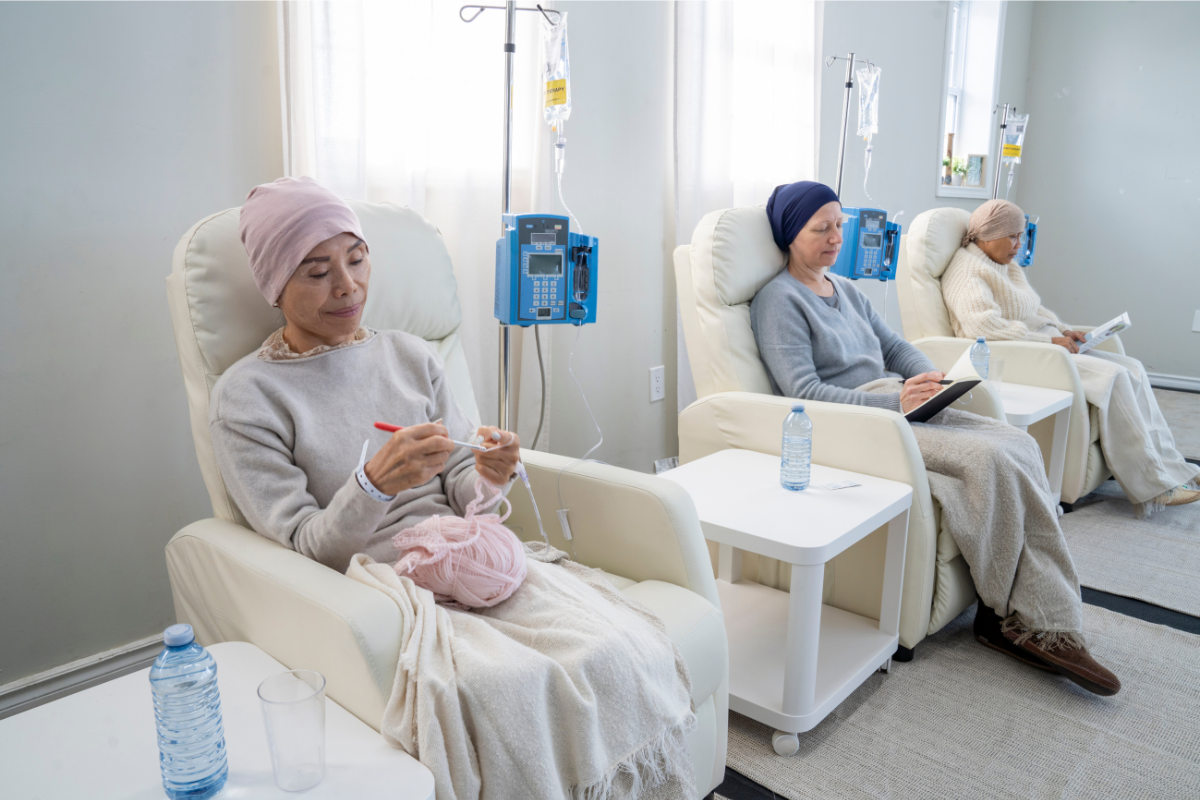Chemotherapy is a common treatment for cancer that involves the use of powerful drugs to destroy cancer cells in the body. While chemotherapy can be highly effective in fighting cancer, it also comes with a range of potential side effects. While many people are aware of the more common side effects, such as nausea and hair loss, there are also lesser-known long-term side effects that can have a significant impact on a person’s quality of life. This article aims to shed light on these often-overlooked side effects, providing important information for those undergoing or considering chemotherapy treatment.
 Image by FatCamera
Image by FatCamera
Understanding the Importance of Long-term Side Effects
When it comes to chemotherapy, it is crucial to consider not only the immediate side effects but also the long-term ones. While the immediate side effects might be more visible and disruptive in the short term, understanding the potential long-term effects can help patients make more informed decisions about their treatment options.
Long-term side effects are those that persist or develop after the completion of chemotherapy. These effects can vary from person to person, depending on factors such as the type of cancer, the specific chemotherapy drugs used, and individual health conditions. Some of the lesser-known long-term side effects include cognitive problems, nerve damage, fertility issues, heart and lung problems, and an increased risk of developing secondary cancers.
By understanding the importance of these long-term side effects, patients can have more realistic expectations about their recovery process and work with their healthcare team to manage any potential complications. It is crucial for healthcare providers to educate patients about these lesser-known side effects to ensure that they receive comprehensive care and support throughout their cancer treatment journey.
The Lesser-known Long-term Side Effects of Chemotherapy
Chemotherapy is a powerful treatment that can effectively target and destroy cancer cells. However, it is important to acknowledge that this treatment approach comes with its fair share of long-term side effects. In this section, we will explore some of the lesser-known long-term side effects of chemotherapy that patients should be aware of.
One of the commonly experienced long-term side effects is cognitive problems. Many chemotherapy patients report difficulties with memory, concentration, and processing information. This phenomenon, often referred to as "chemo brain," can persist for months or even years after treatment. Coping with cognitive problems can be challenging, but there are strategies such as mental exercises and cognitive therapy that can help patients manage these issues.
Another lesser-known long-term side effect is nerve damage, also known as peripheral neuropathy. Some chemotherapy drugs can cause damage to nerves, resulting in symptoms like pain, numbness, tingling, or weakness in the hands and feet. Patients may find it difficult to perform certain tasks or experience a decrease in their overall quality of life. Physical therapy and medications can be used to alleviate these symptoms and improve nerve function.
Furthermore, chemotherapy can have long-term effects on the heart and lungs. Some drugs used in chemotherapy can weaken the heart muscles or cause inflammation in the lungs. This can result in conditions such as heart failure or difficulty breathing. Regular heart and lung function tests are essential to monitor any potential complications and manage them appropriately.
Lastly, undergoing chemotherapy can increase the risk of developing secondary cancers. While chemotherapy effectively targets cancer cells, it can also affect healthy cells in the body, potentially causing DNA damage that may lead to the development of new cancers in the future. Patients should remain vigilant and undergo regular screenings to detect any signs of secondary cancers early.
It is crucial for patients to be aware of the lesser-known long-term side effects of chemotherapy. By knowing what to expect, they can take proactive measures to manage these side effects and seek the necessary support from their healthcare team and support groups. Let’s discuss strategies and treatments available to help mitigate the impact of these long-term side effects on patients' lives.
 Image by Shop Wrenée
Image by Shop Wrenée
Cognitive Impairments and Memory Loss
Cognitive impairments and memory loss, commonly known as "chemo brain," are long-term side effects that chemotherapy patients experience. These side effects can persist for months or even years after treatment has ended. It can be frustrating for patients to deal with difficulties in memory, concentration, and processing information, but there are ways to cope with and manage these issues.
One strategy to mitigate cognitive impairments is through mental exercises. Engaging in activities that challenge the brain, such as puzzles, reading, and learning new skills, can help improve cognitive function. Additionally, cognitive therapy, which involves working with a therapist to develop strategies and techniques, can also be beneficial in managing cognitive impairments.
It is important for patients to communicate their concerns with their healthcare team, as they can provide guidance and support. They may recommend certain medications or lifestyle modifications that can help alleviate these cognitive issues. It is also helpful for patients to seek support from support groups or counseling, as talking to others who have experienced similar cognitive impairments can provide a sense of understanding and validation.
.png) Image by Shop Wrenée™ T-Shirts available by Myeloma For Life™
Image by Shop Wrenée™ T-Shirts available by Myeloma For Life™
Cardiovascular Complications
While most people are aware of the short-term side effects of chemotherapy, such as hair loss and nausea, there are lesser-known long-term effects that can have a significant impact on a patient's health. One such effect is the risk of cardiovascular complications.
Chemotherapy drugs can damage the heart and blood vessels, leading to an increased risk of heart disease, heart attack, and stroke. The risk is particularly high for patients who already have pre-existing cardiovascular conditions.
It is crucial for patients undergoing chemotherapy to be proactive in monitoring their cardiovascular health. This includes regular check-ups with a cardiologist, who can assess any potential damage and prescribe appropriate medication or lifestyle changes.
Furthermore, adopting a heart-healthy lifestyle can help mitigate these risks. This involves maintaining a balanced diet, engaging in regular exercise, managing stress levels, and avoiding tobacco and excessive alcohol consumption.
In the next section, we will delve into another long-term side effect of chemotherapy: fertility issues. Stay tuned to learn about the impact of chemotherapy on reproductive health and the available options for patients who wish to preserve their fertility.
 Image by Blue Cinema
Image by Blue Cinema
Fertility Challenges
For many cancer patients, the possibility of fertility challenges caused by chemotherapy is a topic that often goes unnoticed. However, it is vital to address the potential impact of chemotherapy on reproductive health and the available options for patients who wish to preserve their fertility.
Chemotherapy drugs can damage the reproductive organs, disrupt hormonal balance, and even cause infertility. For women, this can include early menopause or irregular menstrual cycles, while men may experience decreased sperm count or motility. It is crucial for patients to discuss these concerns with their healthcare team prior to beginning treatment.
Thankfully, there are various fertility preservation options available to cancer patients, depending on their age and specific circumstances. These include egg or sperm freezing, embryo banking, and ovarian or testicular tissue preservation. By considering these options before starting chemotherapy, patients can potentially increase their chances of starting a family in the future.
Emotional and Psychological Changes
While most people are aware of the physical side effects of chemotherapy, such as nausea, hair loss, and fatigue, the emotional and psychological changes that can occur are often overlooked. Coping with a cancer diagnosis and undergoing chemotherapy can be emotionally challenging, and many patients experience a range of emotions that can have long-term effects on their mental health.
Chemotherapy can lead to feelings of depression, anxiety, and even post-traumatic stress disorder (PTSD) in some patients. The fear of cancer recurrence, the stress of treatment, and the overall disruption of daily life can take a toll on a person's emotional well-being. Additionally, some chemotherapy drugs themselves can directly affect mood and cognition.
It is crucial for patients to seek support and understand that experiencing these emotional and psychological changes is not uncommon. Talking to a therapist or joining a support group can provide a space to express emotions and learn coping strategies. Engaging in relaxation techniques, such as meditation or deep breathing exercises, can also help manage stress and anxiety.
 Image by Sisuka
Image by Sisuka
Digestive Issues
Another lesser-known long-term side effect of chemotherapy that many patients experience is digestive issues. Chemotherapy drugs can affect the lining of the digestive tract, leading to a variety of gastrointestinal symptoms.
One common digestive issue is chemotherapy-induced diarrhea. This is characterized by frequent loose or watery bowel movements, which can be uncomfortable and disruptive to daily life. On the other hand, some patients may experience constipation, where bowel movements become difficult or infrequent.
Chemotherapy can also cause nausea and vomiting, which can further exacerbate digestive issues. These symptoms can make it difficult for patients to maintain a healthy diet, leading to weight loss or malnutrition.
It is essential for patients to work closely with their healthcare team to manage these digestive issues effectively. Medications, dietary changes, and lifestyle modifications may be recommended to alleviate symptoms and promote better digestive health.
Bone and Joint Problems
Chemotherapy treatment can have long-term effects on the bones and joints. Many patients are unaware of these side effects, but it is important to be informed and prepared.
One of the potential issues is bone loss, also known as osteoporosis. Chemotherapy drugs can affect the balance between bone formation and resorption, leading to weakened bones and an increased risk of fractures. This can be especially concerning for postmenopausal women, as they are already at a higher risk for osteoporosis.
Another common problem is joint pain and stiffness. Chemotherapy can cause inflammation in the joints, resulting in discomfort and limited mobility. This can significantly impact a person's quality of life and ability to perform daily activities.
To mitigate these issues, patients may be advised to incorporate weight-bearing exercises and calcium-rich foods into their routine. Additionally, bone density tests and medication may be recommended to prevent or manage osteoporosis.
It is crucial to discuss these potential side effects with your healthcare team and seek appropriate interventions to maintain bone and joint health during and after chemotherapy treatment.
Next blog- Navigating Chemotherapy Challenges: Tricks and Tips to Conquer Side Effects

